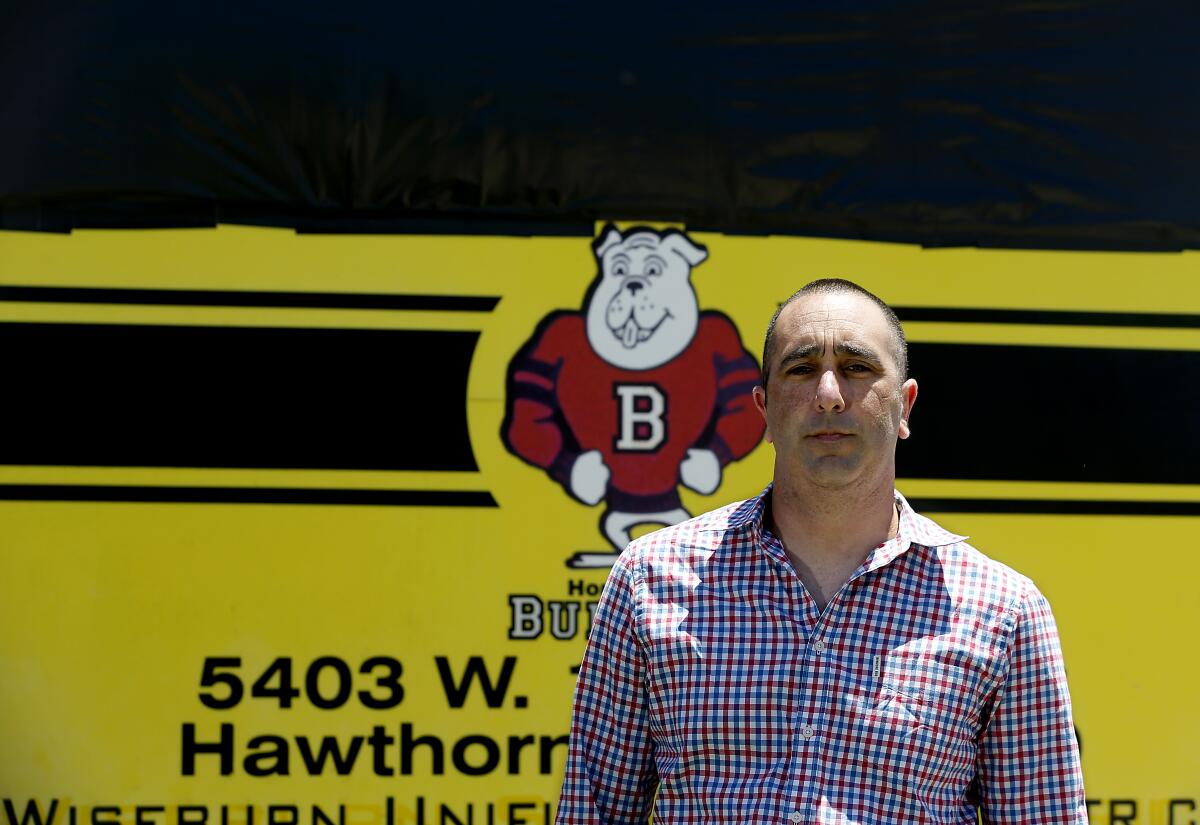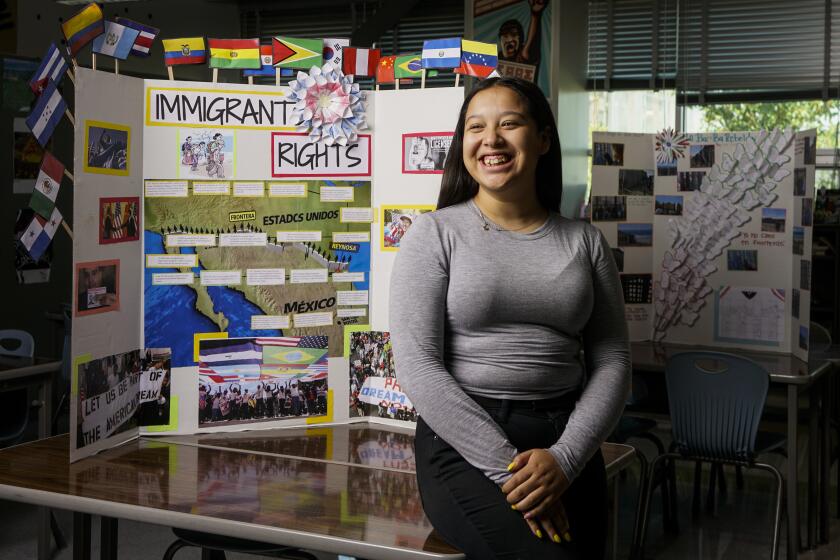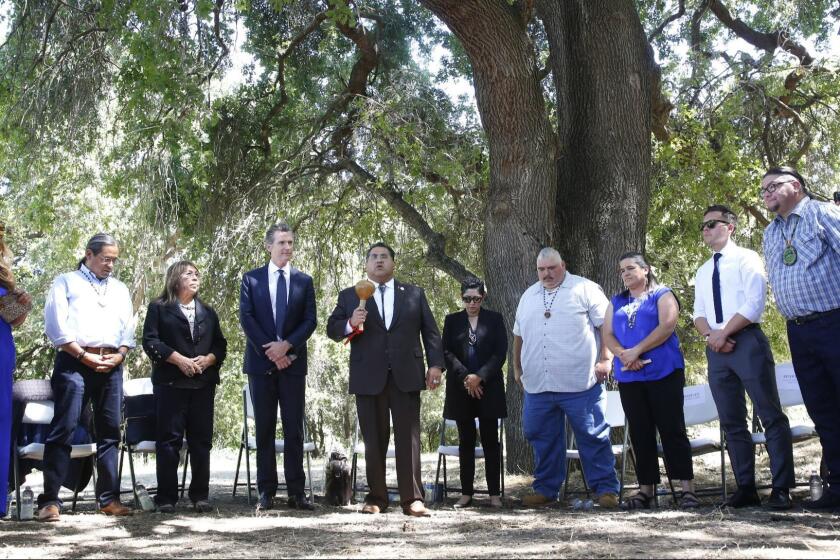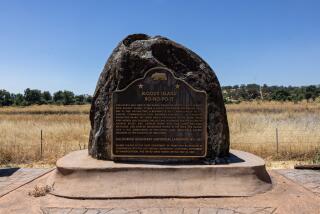Citing racist past, Hawthorne elementary school drops Peter Burnett name

As one by one, monuments and markers linked to California’s racist past were being toppled by protesters last month or hastily moved out of sight, a small school district in Hawthorne set its sights on an elementary campus named after the state’s first elected governor.
Peter Burnett Elementary, one of three primary schools in Hawthorne, opened in 1956 as the namesake of California’s first chief executive, whose public racist biases targeted Black, Chinese and Native American people in the 1800s.
Wiseburn Unified School District Supt. Blake Silvers said the school’s moniker had come under fire previously, but it wasn’t until the June protests following George Floyd’s death that he more fully considered the hurt the name inflicted, particularly on people of color.
At a Black Lives Matter protest organized by district students, Silvers saw one boy toting a sign stating: “Did you know our school is named after the racist Peter Burnett?”
Rising-fifth grader Levi Meeker learned about Burnett’s history last year after he and his grandfather decided on a whim to research the school’s namesake. The two were horrified to learn about the former governor’s vitriolic hatred.
“A lot of people looked at it, and a lot of people seemed very surprised at that,” Levi said of his sign at the protest.
Word about Burnett spread among the families at the rally. Silvers listened too.
Ali Wood, Levi’s mother, said Silvers told parents and students they should submit comments ahead of the school board’s June 10 meeting. Nearly 30 people sent in their thoughts. At the beginning of the meeting, an emergency measure to remove Burnett’s name from the school was added to the agenda.
California lawmakers are poised to make ethnic studies a graduation requirement in high schools and at Cal State universities.
District parent Ann Carlson was among those who weighed in.
“Peter Burnett would’ve hated our diverse community and all that it stands for. How can we ask our students to study under his name?” she asked.
The virtual meeting started with the Pledge of Allegiance. A photo of a fluttering American flag filled the Zoom screen as tiny boxed images showed school board trustees standing at home, hand over heart. Board Vice President Neil Goldman took note of the significance of the words.
“The last line says, ‘with liberty and justice for all,’” Goldman said. “These are inspiring, aspirational words; but the reality in this country falls well short of this idea.”
Early in his political career, while serving in the office of provisional supreme judge in what is now Oregon, Burnett in 1844 signed the state’s first exclusion laws, forcing Black people to leave the region or face floggings. Six years later, as governor of California, Burnett declared in his State of the State address “that a war of extermination will continue to be waged between the races until the Indian race becomes extinct.” And even after leaving politics, he was an advocate for the Chinese Exclusion Act, which prohibited the movement of Chinese immigrants in and out of the country.
Because of those beliefs, many say his name has no business on a school.
Gary Stickel, a former UCLA archaeologist who works with the Kizh Nation of the Gabrieleño Band of Mission Indians, said Burnett called for the extermination of California’s Native Americans and even put bounties on them.
“Burnett was a terrible racist,” Stickel said. “Not only was he against Indians, he tried to pass a law that no African Americans could live in California and shot and killed an African American man in cold blood.” He noted that the governor was forced to resign after only one year in office because of his broad unpopularity.
Last year, Gov. Gavin Newsom condemned Burnett in an apology for historical violence against Native Americans, using the word “genocide” to describe the brutalization his predecessor promoted.
Over the last six years, schools in Long Beach and San Jose have dropped Burnett’s name. Silvers said it was time for the Hawthorne school to do the same.
So many community members submitted remarks during last month’s school board meeting, exhausting the 20-minute public comment period, that some had to be read at the next meeting, two weeks later. All but one favored a name change.
“How can we honesty tell our children — particularly our children of color — that they are welcome and equal in our schools while memorializing a man who did not even treat their ancestors as human beings?” parent Kayli Weatherford asked.
Burnett student Tyler Tuttle said: “I am not proud to attend a school named after someone who is the opposite of ‘Bulldog Best,’” referencing the school’s mascot.
The board unanimously agreed, and selected 138th Street Elementary as the temporary name for the third-through-fifth-grade school.
Since then, the district has gone about scrubbing Burnett’s name from the campus. Websites have been updated to reflect the new name, and signs at the school with the former governor’s name have been covered.
“We wanted to immediately eliminate the name, and so from that point, we’ve actually covered up as much of the signage as we could cover up, which is difficult because there are things carved in granite,” Silvers said.
Levi, who was among the community members who submitted comments to the meeting, is glad for the change.
“Naming someone as our school is basically commemorating them. You don’t want to commemorate someone who was racist and was not inclusive of all different types of people. Even though we do want to know about it, to know what we shouldn’t do, we should commemorate people who did the right thing,” he said.
Still, he said he doesn’t deserve credit for the change. The whole community played a part, he said. And as such, the whole community — including the elementary school’s students — should play a role in picking the new name too.
Silvers said he hopes a fresh title will be adopted by the time school starts in early September, but a community advisory committee still needs to be established. He said he’d like to see students help pick the new name, noting that the board has already received dozens of suggestions, including Kobe Bryant, Michelle Obama, Jackie Robinson and Mae C. Jemison, the first black woman in space.
Stickel has his own proposal.
“There’s no one more appropriate to rename this Burnett school for than Toypurina,” the tribal archaeologist said, citing an oft-overlooked indigenous woman who he said led a revolt against the Spanish Empire that brutalized local tribes in the name of the San Gabriel Mission.
“She fought for human decency and freedom, and to me, she’s a great American, unsung.”
More to Read
Sign up for Essential California
The most important California stories and recommendations in your inbox every morning.
You may occasionally receive promotional content from the Los Angeles Times.













